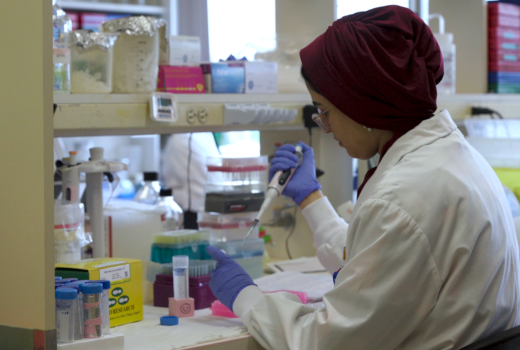
The Baker Centre for Pancreatic Cancer is celebrating its five year milestone with the opening of a new state-of-the-art organoid facility, a significant advancement in personalized medicine. This fully donor-funded facility represents a crucial step in the centre's mission to offer customized treatment solutions for patients with cancer and will serve several areas of cancer care at London Health Sciences Centre (LHSC).
“The Baker Centre is helping to create opportunities for both clinical and scientific advancements," said Dr. Chris Pin, Scientist at London Health Sciences Centre Research Institute (LHSCRI). “With this new facility, we have the potential to not only identify the right types of treatment to give a patient, but also discover novel therapies that may be specific to an individual.”
Researchers at the Baker Centre, like Dr. Pin, will take tumour samples from patients and grow them in the lab as organoids, artificially grown masses of cells or tissue resembling an organ. Since it's challenging to predict how a tumour will react to various treatments, this approach allows researchers to test responses outside the body.
Organoids can be obtained during routine endoscopic ultrasound (EUS) procedures, which are essential for diagnosing pancreatic cancer. Each organoid preserves unique genetic information of the patient, which is analyzed to assess and refine treatment options for not only patients with pancreatic cancer, but many other cancers.
The goal of the organoid facility will be to provide a personalized, in-depth analysis of tumours from patients indicating first and second line treatment options. Additionally, it will enable the discovery of new treatments that can be tailored to individual patients, something Shelley and her late husband Rick were passionate about.
“The Baker family extends their heartfelt gratitude to the team at the Baker Centre for Pancreatic Cancer for their incredible achievements over the past five years,” shared the Baker family with sincere appreciation. “Rick would be immensely proud of the Centre's unwavering dedication to his vision—improving patient outcomes and participating in global research in pancreatic cancer. We are excited to continue supporting the Centre's mission and look forward to making an even greater impact in the years ahead.”
Serving the entire Southwest region of Ontario, the Baker Centre has made notable progress, having assisted over 950 patients to date and participated in several clinical trials. Previously operating out of the Gerald C. Baines Centre for Translational Cancer, the Baker Centre now officially has its own space within the Verspeeten Family Cancer Centre (VFCC).
The Baker Centre opened in 2019 with a $1.5 million donation from Rick and Shelley Baker, to enhance local pancreatic cancer care and research in London. Their support helps ensure advanced treatment options are available close to home for patients. To date, London Health Sciences Foundation has raised $9.25 million for the Centre.
The Baker Centre has made remarkable progress in pancreatic cancer care and research, with about a dozen ongoing or completed research projects and clinical trials. Funding has been allocated for High Impact Research Initiatives, Catalyst Grants and the Organoid Program.
Key highlights include:
- The Baker Centre secured over $1.6 million in research funding through matching funds or support to programs.
- Completion of 70 pancreatic surgical resections annually, improving patient outcomes through expert surgical care.
- Opening of the physical Baker Centre clinical offices and Organoid Facility in 2024, enhancing research and treatment capabilities.
- Roughly 450 patients and families followed annually by a Patient Health Navigator.
Under the leadership of Dr. Stephen Welch, medical oncologist at LHSC, the Baker Centre has achieved significant progress in advancing the care and treatment of patients with pancreatic cancer. This progress is especially crucial given that pancreatic ductal adenocarcinoma (PDAC), the most common and one of the deadliest forms of pancreatic cancer, has a five-year survival rate of only about 10 per cent. The Baker Centre's advancements underscore a critical need for ongoing innovation and support in this challenging field.
